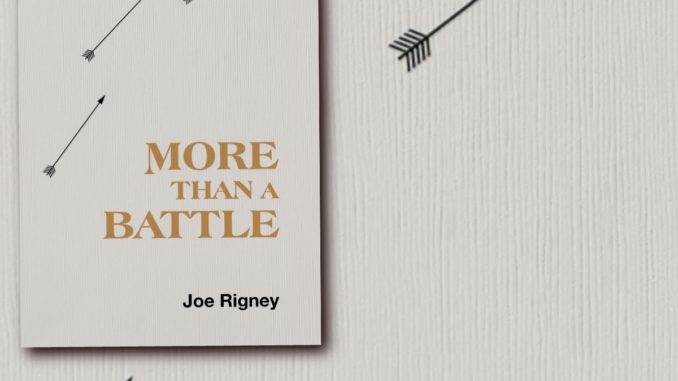
Also by this author: Strangely Bright: Can You Love God and Enjoy This World?, More Than a Battle: How to Experience Victory, Freedom, and Healing from Lust
Published by B&H Publishing on February 2, 2021
Genres: Non-Fiction, Christian Life
Buy on Amazon
Goodreads

It has never been more difficult to flee sexual immorality and pursue holiness.
We live in an age of unprecedented access to sexual temptation. Previous generations faced adultery, prostitution, and brothels. But not every person had a brothel in their pocket. Our society’s obsession with sex, coupled with the technologies that make pornography so accessible, make it more challenging than it’s ever been.
The result is that our families, our churches, and our society are being devastated by a pornography epidemic.
In More than a Battle, pastor and author Joe Rigney offers hope for Christian men who are seeking to live with integrity and faithfulness in the face of the sexual temptation around them. Drawing on the Scriptures, his personal experience, and his pastoral counseling, Rigney frames the struggle with lust beneath the banner of Galatians 5:16: "Walk by the Spirit and you will not gratify the desires of the flesh.”
The struggle with lust is a fierce battle, an enslaving addiction, and a deep brokenness. Rigney shows us that through the gospel it is the Holy Spirit that gives us victory, sets us free, and heals our wounds.
It was bad timing for this book to arrive when it did. The Atlanta massage shootings occurred on March 16th and this book arrived on my doorstep on March 17th. For a book with a title like, More Than A Battle: How to Experience Victory, Freedom, and Healing from Lust to have arrived just after a man had murdered eight women in order to “eliminate [his] temptations” was unfortunate in that it offered it little chance at an unbiased reading.
This being said, even without this context in place the book isn’t all that good, it takes too much for granted and inserts too many absolutes in a world of gray. As he frames it the book is aimed primarily towards men and specifically towards men who are struggling with lust and pornography and men who want to help them, that being said he does offer a brief hope that “women who struggle with pornography and lust will find this book helpful as well.” What should be added here though is what is overlooked: this isn’t just a book directed towards men (which, I should add is fine), but without any admission it’s directed towards heteronormative men specifically. At no point does Rigney offer any insight, or even acknowledgement of men on the LGBTQ spectrum who might be struggling with pornography and lust, in fact if you just read this book it would seem as though no such people exist, that porn is almost exlusively a men’s issue.
This might be one of my main critiques of the book: not only is this exclusively aimed towards men, it’s aimed towards men with Rigney telling you about women but he never actually brings women into the conversation or offers perspectives that might differ. For example, when discussing the problems of pornography he uses a number of grand and absolute statements which require a certain worldview to accept, “Every woman participating in pornography is being exploited and abused… Even a woman who willingly participates is doing so because she’s believing lies or is so broken that she numbs the pain through sexual exploitation.” (p78, italicized for emphasis). Referring to someone as broken, especially when there are many within the porn and sex work industry who would claim they’re being empowered by their work is selective at best and silencing at worst. In this same section he talks about the false expectations men enter into marriage with due to pornography where they come to believe “women desire sex in the same way as men.” Again, it may be true that some women don’t desire sex as much as men just as it may be true that some women (or for the sake of argument even many women) are exploited and abused by the porn industry but there are many who don’t match this absolute statement and their voices seem to be omitted from the conversation.
These aren’t the only instances of Rigney misusing language either in ways that are imprecise and misleading, in one section he attempts to break down exactly why porn is bad and to do it he enters into a discussion of anthropology, however it would be more accurately defined as “Reformed Anthropology” as it takes a scientific term for the study of human culture and society into the Reformed understanding of humanity viewed through the lens of their interpretation of the Fall. Again, this wouldn’t be a problem if it were not presented in terms of the sciences but as it is it leads to a feeling of insincerity.
There are strong moments in this book such as when Rigney alludes to a sort of shame cycle where he argues that we pursue pornography in part because we crave not only the pleasure but also the reaffirmation that we should be ashamed of ourselves. This might be the strongest argument he makes and if he’d centered more of the book on this rather than a page it would have been more beneficial to the overall argument and led to something more liberating.
All of this being said, if a small group or men’s accountability group were looking for something to base their studies off of there are far worse books than this one on the market. However, the Complementarianism, the pseudoscience, the continued erasure of other voices, and the imprecise use of language leads me to be unable to recommend this book for any serious study or discussion.
